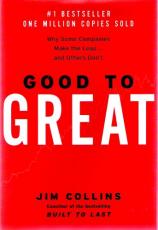Reading Group Guide
Discussion Questions
Good to Great: Why Some Companies Make the Leap...And Others Don't

1. Collins states in the Introduction to the book, "I'd like to say we planned the timing, but we began this project in 1996 and had no idea that it would fit perfectly the zeitgeist of 2001. We got lucky." Do you believe that Collins and his team of researchers were simply "lucky"? Why or why not?
2. What do you think of the research methods employed by Collins and his team? Do you agree with the methods that they used? What would you have done differently?
3. One of the most crucial criteria set forth was the requirement for companies to have achieved success and maintained it for fifteen years. "We picked fifteen years because it would transcend one-hit wonders and lucky breaks (you can't just be lucky for fifteen years) and would exceed the average tenure of most chief executive officers (helping us to separate great companies from companies that just happened to have a single great leader)." Do you agree with this assessment? How would the results of the study have differed if this particular criteria had been altered?
4. The research team identified a series of steps that characterize good-to-great transitions: Level 5 Leadership, First Who…Then What, Confront the Brutal Facts, The Hedgehog Concept, A Culture of Discipline, Technology Accelerators, and The Flywheel and the Doom Loop. Which of these factors is the most crucial to a company's success? Do you think it is imperative for a successful company to have all of these factors?
5. Collins called Level 5 Leadership "one of the most provocative [steps] of the whole study." Do you agree? Of the CEOs profiled in the book, who do you think most exemplifies the qualities of Level 5 leadership? Explain why you chose this person.
6. Collins and his team "were surprised by the list" of good-to-great companies: Abbott, Circuit City, Fannie Mae, Gillette, Kimberly-Clark, Kroger, Nucor, Philip Morris, Putney Bowes, Walgreens, and Wells Fargo. Were you surprised by the companies that appeared on the list? Are there any companies that you expected to appear that were absent?
7. He also says that "this became the first of many surprises that led us to reevaluate our thinking about corporate greatness." The fact that they were surprised means that they went into the study with certain assumptions. What were those assumptions?
Good to Great: Why Some Companies Make the Leap...And Others Don't
- Publication Date: February 19, 2013
- Hardcover: 300 pages
- Publisher: HarperBusiness
- ISBN-10: 0066620996
- ISBN-13: 9780066620992







